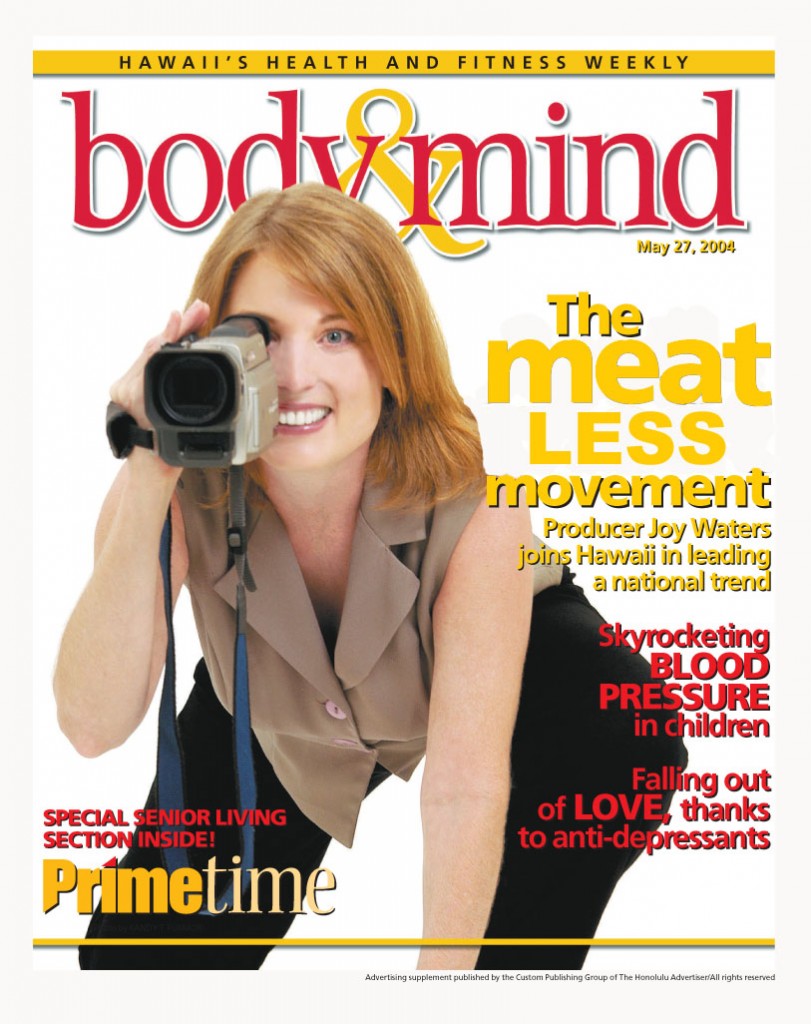 Mention the word “vegetarian” and people used to envision skinny hippies and zealous animal rights activists. But the image of vegetarians is becoming less extreme and more mainstream, perhaps due in part to the weekly TV series “Tasty and Meatless” produced by local media maven Joy Waters for Time Warner Cable.
Mention the word “vegetarian” and people used to envision skinny hippies and zealous animal rights activists. But the image of vegetarians is becoming less extreme and more mainstream, perhaps due in part to the weekly TV series “Tasty and Meatless” produced by local media maven Joy Waters for Time Warner Cable.
Research shows vegetarians have better health
There is mounting medical evidence showing the benefits of a vegetarian or primarily vegetarian diet. The largest study ever comparing the health of vegetarians and meat eaters found that vegetarians’ risk of heart disease is half that of non-vegetarians. In addition, their likelihood of getting colon cancer is reduced by 40percent and their risk of bladder cancer is lowered by 50percent. The study, conducted between 1976 and 1988 by Loma Linda Medical Center, Los Angeles, reviewed the health of 34,000 Seventh-Day Adventists in California. Half were vegetarian, a quarter ate meat sparingly and another quarter had normal American diet.
In addition to enjoying better health, the vegetarians who participated in the study lived longer on average that those who ate meat — 7.5 years for women and 8.3 years for men. those who followed a non-vegetarian diet with reduced fat and high fiber were in better health that those who had a normal diet, but they were not as healthy as dedicated vegetarians. So why meat so bad for us? “Meat is loaded with saturated fat and has no dietary fiber,” says Dr. Gary Fraiser, the principal investigator for the study. “There is no difference between red meat and white meat. Both had the same negative impact on health.” Friser notes that in addition to meat being bad in itself, meat eaters usually consume less fruits and vegetables important antioxidant and phytochemical that are essentials to health at a cellular level.
So powerful is the research supporting a vegetarian diet that many in the medical community think that adopting a near-vegetarian diet is one of the most effective and economical ways for Americans to combat a host of maladies including cancer, heart disease, stroke, obesity and diabetes.
The national enter for Disease Control, which has been promoting the consumption of five servings of fresh fruits and vegetables a day is preferable and that five servings should be considered the bare minimum. The benefits of eating more fruits and vegetables has led many people to seek healthy options when dining out. The American Association reported in 2001 that 80 percent of restaurants with table service offer vegetarian options. Even McDonald’s which had solid billions of beefy hamburgers, is proudly promoting its new McVeggie burger.
Hawaii is leading the national trend toward vegetarianism asserts Jim Brown, vice president of the 1,600-member Vegetarian Society of Hawaii. He says the organization is the largest vegetarian society in the country, which has given it the resources to draw national speakers and launch a local TV campaign to promote vegetarianism.
Tasty and Meatless TV educates viewers
Nearly two years ago, Oceanic Time Warner Channel 16 began airing a half-hour vegetarian lifestyle show. Called “Tasty and Meatless in Hawaii,” the program is probably the only one of its kind in the country, according to Joy Waters, its creater and producer. Waters, who has been a strict vegetarian for five years, began the show as part of a personal mission to help people make the transition to a vegetarian diet. “If you’re already a vegetarian, there are plenty of resources to help you,” she says. “We want to help people who maybe haven’t made the commitment to be vegetarian, but want to have a healthier diet.”
Part of the show’s intent, says Waters, is to dispel myths about vegetarians being outside of the mainstream by featuring a broad cross sections of various ages and ethnicities. Each show included a cooking segment, restaurant reviews and an opportunity for viewers to have their questions answered by Dr. John Westerdahl, director of Castle medical Center’s Wellness and Lifestyle Medicine Center.
The program also aims to show that vegetarian dishes can be tasty, nutritious and easy to prepare. “Taste has to be first, then convenience,” says Waters, who believes that preparing vegetarian meals can be easy as meat-centered meals with a little planning.
Waters says “Tasty and Meatless” attracts a loyal following of viewers statewide. She is particularly pleased that many viewers live in Kalihi, Wainae and other areas of Oahu where poor dishes have led to an increase in obesity and other chronic health problems. In the future, Waters hopes to produce “Tasty and Meatless” programs for other cities, but getting sufficient advertisers to support the show in Hawaii has been a challenge. So far, she has had to use her savings to launch and maintain the show. “It’s difficult at times, but it’s also very gratifying,” she says. “I know from the e-mails and letters that we receive that we are helping a lot of people.”
Article originally published in Body and Mind magazine, Hawaii’s Health and Fitness Weekly printed by the Honolulu Advertiser.


 Subscribe to our
Subscribe to our